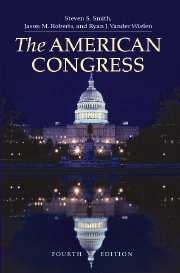Book contents
- Frontmatter
- Contents
- Preface
- 1 The American Congress: Modern Trends
- 2 Representation and Lawmaking in Congress: The Constitutional and Historical Context
- 3 Congressional Elections and Policy Alignments
- 4 The Rules of the Legislative Game
- 5 Members, Goals, Resources, and Strategies
- 6 Parties and Leaders
- 7 The Standing Committees
- 8 The Floor and Voting
- 9 Congress and the President
- 10 Congress and the Courts
- 11 Congress, Lobbyists, and Interest Groups
- 12 Congress and Budget Politics
- Notes
- Suggested Readings
- Index
- Picture Credits
Preface
- Frontmatter
- Contents
- Preface
- 1 The American Congress: Modern Trends
- 2 Representation and Lawmaking in Congress: The Constitutional and Historical Context
- 3 Congressional Elections and Policy Alignments
- 4 The Rules of the Legislative Game
- 5 Members, Goals, Resources, and Strategies
- 6 Parties and Leaders
- 7 The Standing Committees
- 8 The Floor and Voting
- 9 Congress and the President
- 10 Congress and the Courts
- 11 Congress, Lobbyists, and Interest Groups
- 12 Congress and Budget Politics
- Notes
- Suggested Readings
- Index
- Picture Credits
Summary
The American Congress has long been one of the most powerful legislative bodies in the world. Congress is now struggling with momentous issues such as the regulation of the health care industry, public investment in rapidly changing electronic technologies, retirement security, the war against terrorism, and the place of the United States in the post–Cold War world. These issues present a serious challenge. They affect the interests of all Americans, they are highly controversial, and they involve technical subjects and complex public policies.
Major Features of The American Congress
Understanding the Place of Congress in American Democracy. Our primary goal in writing this edition is to instill in students and general readers an appreciation for the importance of a strong legislature in the American democracy. Such an appreciation requires an understanding of the constitutional setting in which Congress operates, the basic rules of the electoral and legislative processes, and the resources and strategies of members of Congress and other key players. Each chapter is designed to contribute to the reader's understanding by introducing key concepts, describing essential details of the process, and outlining general principles for understanding the subject.
The Changing Congress. In our efforts to introduce you to congressional politics, we emphasize the evolving nature of Congress. In writing a textbook, it is easy to describe current arrangements and create the impression that the rules and processes described have long been as described and are likely to stay that way for some time.
- Type
- Chapter
- Information
- The American Congress , pp. vii - xiiPublisher: Cambridge University PressPrint publication year: 2005



